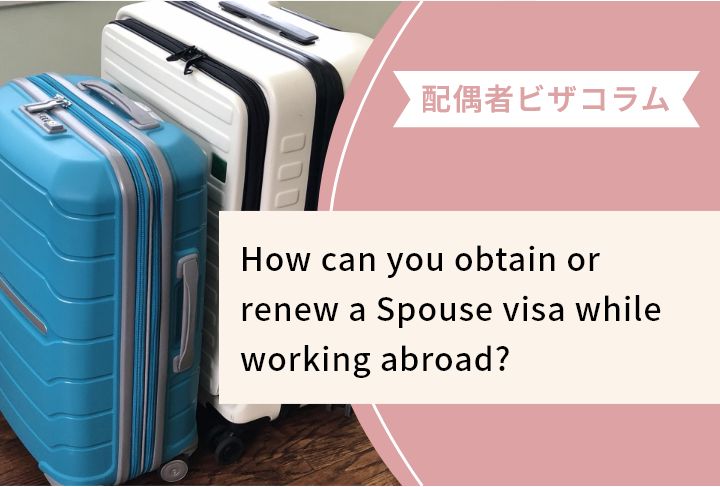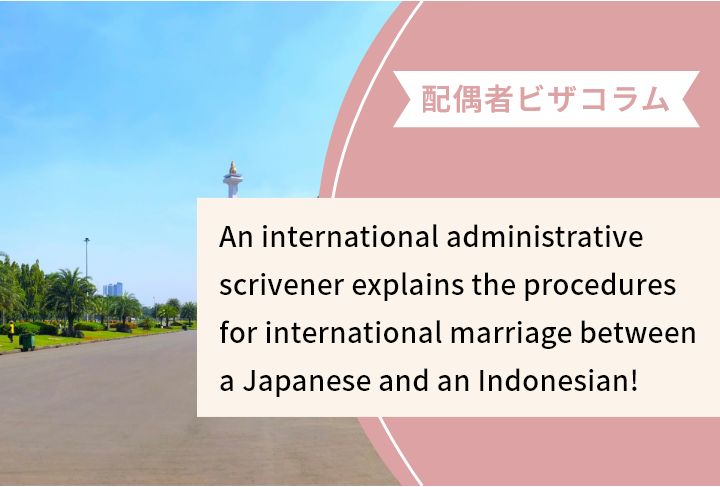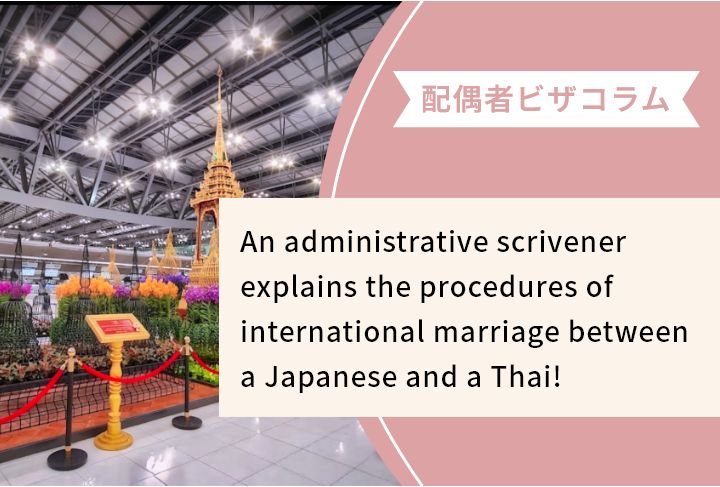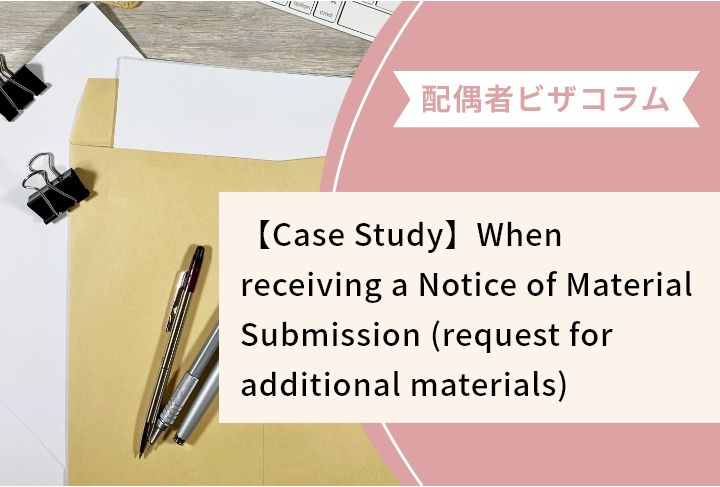【Case Study】How to settle an overstay case: the system of departure orders
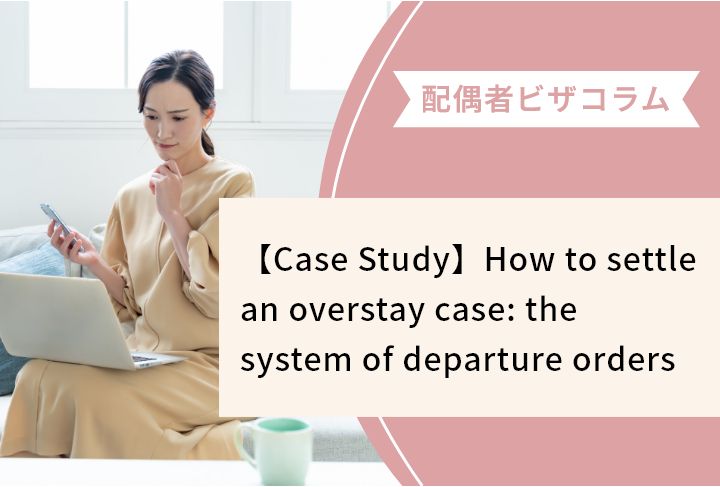
There is a couple preparing to get married after seeing each other for 4 months. However, there is a huge problem standing in their way. The boyfriend is an overstayer! The extension of his student visa has been denied while he was still in school, and since then, he has been overstaying his visa.
For the first time, he confessed to his Japanese girlfriend about his such status, but she didn’t really understand the situation and decided to research on internet on her own as to how to settle a case of overstay. She tried, but there were so many technical terms, and so she came to us for consultation.
“My fiancé (or fiancée) is an overstayer and I don’t know what to do with that…”
We accept this kind of cases from all over Japan. From our experience, overstaying can be a trigger for another crime as overstayers may face financial difficulties after living in Japan illegally for a long time. In such case, we feel helpless and wish they had come to us earlier.
Although some people may think overstaying is nothing more than the expiration of visa, it actually is against the law. Besides, it is said that there is a danger that overstayers become socially vulnerable people and may easily be induced to commit secondary crimes.
We are hoping that this article reaches as many overstayers as possible, so they can get out of their situation of overstay. With such thoughts, we proceed to explain the system of departure order, which is one of the methods to solve overstay cases.
Index
1. What is “overstay”?
“Overstay” means staying in Japan after the expiration of the period of stay without extending the period of stay or changing status of residence. Overstay is also called as illegal stay and is a type of violation of immigration law.
Overstay is listed as one of the grounds for deportation in Article 24, paragraph (4) (B) of Immigration Act, and in some cases, overstayers can be arrested by the police.
The boyfriend in abovementioned case became an overstayer as the extension of student visa was denied while he was still a student.
He was already in the overstaying situation; and therefore, prompt reaction was required.
2. Choose whether to go back to your country or to stay in Japan!
Overstayers first need to appear at the immigration office. Such appearing to the immigration office is called “shutto-shinkoku” (i.e. self-surrender). After appearing to the immigration office, the foreigner needs to choose whether to apply to stay in Japan.
In case of applying for continuous stay in Japan, the comprehensive judgement of whether the foreigner can stay in Japan will be made during the procedures for deportation based on the specific situation of the overstay, family relationship, living condition, as well as international relations, domestic situation, and any other element which has effect on Japanese society. If the foreigner is granted special permission to stay in Japan (i.e. zairyu-tokubetu-kyoka), the continuous stay in Japan will be admitted.
On one hand, if such special permission to stay is not granted, the foreigner may not re-enter Japan for 5 years in principle as set forth in Article 5, paragraph 1, item (9)(b) of Immigration Act, with some exception.
On the other hand, if the foreigner chooses to return to his or her country, the immigration office will check if he or she is subject to a departure order.
If the foreigner is given a departure order, the period of denial of landing will be shortened to 1 year from the usual 5 years, and there are many other benefits.
However, there is only once chance to express the intention regarding whether to leave or stay in Japan, which is at the self-surrender. Therefore, if there is a good chance that a special permission to stay in Japan will be granted, seeking it in the procedures of deportation will be a better choice. Contrarily, if the chances to receive such permission is low, it is a wise decision to utilize the system of departure orders, so the period of denial of landing will be shortened to 1 year.
3. What is the system of departure orders, which may solve a case of overstay?
The system of departure orders was newly established along with the amendment of the Immigration Act in 2004 based on the political plan of reducing the number of overstayers by half within 5 years. Among the overstayers, those who satisfy the specific requirements may leave Japan by only going through simple procedure without regular deportation and detention procedures.
As the time limit for departure is set, the foreigner’s staying in Japan until the time limit becomes legal. Besides, the period of denial of landing when re-entering Japan is shortened to 1 year. As such, there are many benefits comparing to the normal procedures of deportation.
4. In what kind of cases can the system of departure orders be used?
To use the system of departure orders, you must satisfy the requirements set forth in Article 24-3, paragraph 1 of the Immigration Act. We are going to explain each requirement hereafter.
To use the system of departure orders, you must satisfy the requirements set forth in Article 24-3, paragraph 1 of Immigration Act. We are going to explain each requirement hereafter.
1) The alien has voluntarily appeared at an immigration office with the intention of departing from Japan promptly.
Even if you show your intention to return to your country after exposed or arrested by the police or the immigration office, you do not satisfy this requirement. Also, if you appear at an immigration office, asking for the special permission to stay in Japan, you do not satisfy this requirement.
2) The alien does not fall under any items of grounds for deportation other than overstaying.
If there is any ground for deportation other than overstaying, you do not satisfy this requirement.
3) The alien has not been sentenced to imprisonment with or without work on the charge of a crime specified in laws of Japan including theft.
4) The alien has no past record of being deported from Japan or of departing from Japan under a departure order.
This one requires you not to have overstayed or been deported in the past. However, in case that you have a record of overstaying, but consequently received the special permission to stay in Japan, you satisfy this requirement because there is no record of being deported or departing under a departure order.
5) The alien is expected with certainty to depart from Japan promptly.
Some sources explain that this requirement is filled if air-ticket, etc. is prepared when appearing at an immigration office, but there is no need to prepare air-ticket because the departure date is not decided when appearing at an immigration office. Later on, the immigration officer in charge will tell you when to buy your ticket. So, as long as you prepare your passport and travel expenses to go back to your country, you satisfy this requirement. Please note that you may fail to satisfy this requirement if you are unable to prepare travel expense to go back to your country.
5. What are the benefits of using the system of departure orders?
In this section, we will explain the benefits of the system of departure orders.
1) If you are approved to use the system of departure order, you will not be detained according to the law.
Before the establishment of the system of departure orders, foreigners who had turned themselves in to an immigration office were granted a provisional release (i.e. bail) and then admitted to return to their countries.
However, such conduct has been changed, as the system of departure orders, which was established along with the amendment of the Immigration Act in 2004, has expressly provided an exception to the conduct of detaining all overstayers regardless of their individual situation (Article 39 of Immigration Act).
Accordingly, if foreigners manage to receive approval to use the system of departure orders, they can go back to their countries without being detained by the immigration office.
2) The period of denial of landing for those who are subject to departure orders is shortened to 1 year.
As set forth in Article 5, paragraph 1, item (9)(B) of the Immigration Act, in the normal conduct, those who are deported cannot re-enter Japan for 5 years.
However, if you are approved to be subject to a departure order, the period of denial of landing will be shortened to 1 year (Article 5, paragraph 1, item (9) of the Immigration Act).
3) You can quickly solve the problem.
The period of examination is lengthened (examination takes more than 1 year in some cases), and the unstableness of the position of the examined foreigner is unavoidable and such unstableness may continue for a long time. Some of the people who applied for staying in Japan become mentally disordered due to the fear of deportation.
On the other hand, in case of using the system of departure orders, the judgement of whether the person is subject to departure order usually takes less than 1 month. It is much shorter than when applying to stay in Japan; and therefore, emotional burden should be lessened. Also, since the period of denial of landing is shortened to 1 year, quick and solid settlement can be often expected.
Although it really depends on the case, we have seen many cases where problems are solved faster by using the system of departure orders as long as the person can wait for 1 year of the period of denial of landing.
6. Even if you overstay your visa, you may be able to quickly re-enter Japan by using the system of departure order
Some people have difficulty leaving Japan since they have families in Japan. In such case, seeking a special permission of stay in Japan in the deportation procedure is one way to choose. To do that, careful consideration of the possibility of receiving such permission will be necessary because you are not able to come back to Japan for 5 year if you fail to receive the permission.
To solve the problems of overstaying, it is essential to listen to specialists and make a careful judgement after considering all risks.
Many of our clients have used the system of departure orders and returned to Japan after 1 year. Some of them were feeling hopeless at first, but now they are living in Japan with their families. So, please contact us if you are having a problem of overstaying.
7. Summary of “How to settle an overstay case: the system of departure orders”
In the abovementioned case of a couple, we decided to use the system of departure orders to quickly solve the overstaying status. It was because there was only a slight chance to receive spouse visa since their dating period was short and their financial situation was weak. The couple could have been forced to be apart for a long period of time if they had failed to choose the right method.
We may ask you to make a difficult decision, but we believe using a departure order is an effective way to quickly come back to Japan.
The boyfriend in the example case appeared at the immigration office, attended by one of our administrative scrivener.
As planed in advance, he left Japan using the system of departure order, and after one year, he re-entered Japan. Now they have a child and have a stable life as a family.
If you are worried as you don’t know what to do with your overstaying status, it will be too late if you are exposed by the immigration office or arrested by the police as you will only have a few choices then.
We can come up with the best plans for you.
We hope this article will be somehow helpful for those who are having problems of overstaying.








